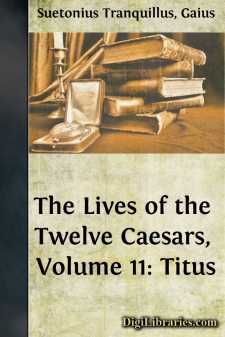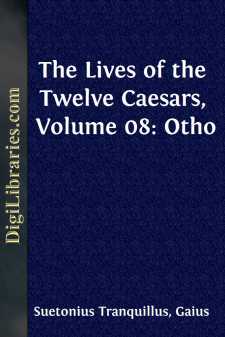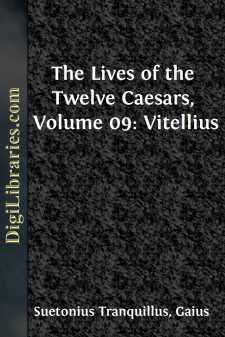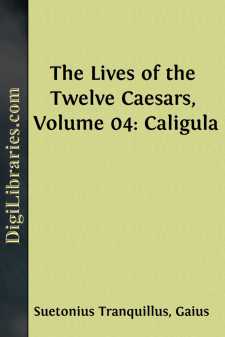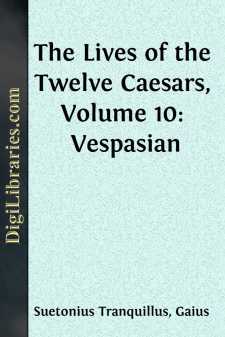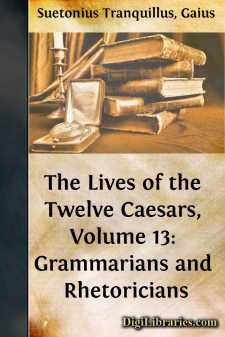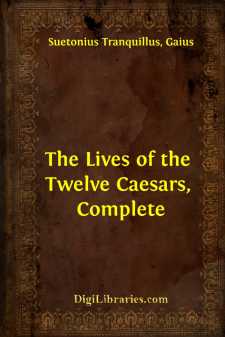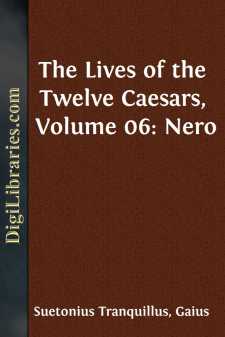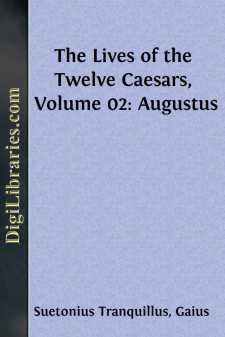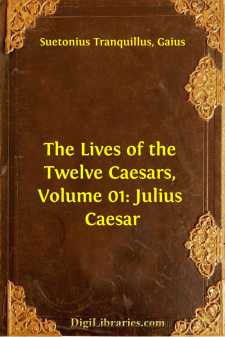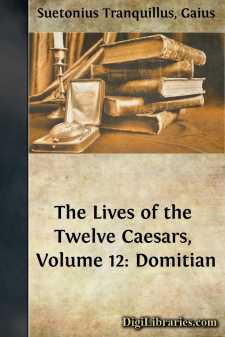Categories
- Antiques & Collectibles 13
- Architecture 36
- Art 48
- Bibles 22
- Biography & Autobiography 813
- Body, Mind & Spirit 142
- Business & Economics 28
- Children's Books 15
- Children's Fiction 12
- Computers 4
- Cooking 94
- Crafts & Hobbies 4
- Drama 346
- Education 46
- Family & Relationships 57
- Fiction 11829
- Games 19
- Gardening 17
- Health & Fitness 34
- History 1377
- House & Home 1
- Humor 147
- Juvenile Fiction 1873
- Juvenile Nonfiction 202
- Language Arts & Disciplines 88
- Law 16
- Literary Collections 686
- Literary Criticism 179
- Mathematics 13
- Medical 41
- Music 40
- Nature 179
- Non-Classifiable 1768
- Performing Arts 7
- Periodicals 1453
- Philosophy 64
- Photography 2
- Poetry 896
- Political Science 203
- Psychology 42
- Reference 154
- Religion 513
- Science 126
- Self-Help 84
- Social Science 81
- Sports & Recreation 34
- Study Aids 3
- Technology & Engineering 59
- Transportation 23
- Travel 463
- True Crime 29
The Lives of the Twelve Caesars, Volume 11: Titus
Description:
Excerpt
TITUS FLAVIUS VESPASIANUS AUGUSTUS.
(465)
I. Titus, who had the same cognomen with his father, was the darling and delight of mankind; so much did the natural genius, address, or good fortune he possessed tend to conciliate the favour of all. This was, indeed, extremely difficult, after he became emperor, as before that time, and even during the reign of his father, he lay under public odium and censure. He was born upon the third of the calends of January, [30th Dec.] in the year remarkable for the death of Caius [776], near the Septizonium [777], in a mean house, and a very small and dark room, which still exists, and is shown to the curious.
II. He was educated in the palace with Britannicus, and instructed in the same branches of learning, and under the same masters. During this time, they say, that a physiognomist being introduced by Narcissus, the freedman of Claudius, to examine the features of Britannicus [778], positively affirmed that he would never become emperor, but that Titus, who stood by, would. They were so familiar, that Titus being next him at table, is thought to have tasted of the fatal potion which put an end to Britannicus's life, and to have contracted from it a distemper which hung about him a long time. In remembrance of all these circumstances, he afterwards erected a golden statue of him in the Palatium, and dedicated to him an equestrian statue of ivory; attending it in the Circensian procession, in which it is still carried to this day.
(466) III. While yet a boy, he was remarkable for his noble endowments both of body and mind; and as he advanced in years, they became still more conspicuous. He had a fine person, combining an equal mixture of majesty and grace; was very strong, though not tall, and somewhat corpulent. Gifted with an excellent memory, and a capacity for all the arts of peace and war; he was a perfect master of the use of arms and riding; very ready in the Latin and Greek tongues, both in verse and prose; and such was the facility he possessed in both, that he would harangue and versify extempore. Nor was he unacquainted with music, but could both sing and play upon the harp sweetly and scientifically. I have likewise been informed by many persons, that he was remarkably quick in writing short-hand, would in merriment and jest engage with his secretaries in the imitation of any hand-writing he saw, and often say, "that he was admirably qualified for forgery."
IV. He filled with distinction the rank of a military tribune both in Germany and Britain, in which he conducted himself with the utmost activity, and no less modesty and reputation; as appears evident from the great number of statues, with honourable inscriptions, erected to him in various parts of both those provinces. After serving in the wars, he frequented the courts of law, but with less assiduity than applause. About the same time, he married Arricidia, the daughter of Tertullus, who was only a knight, but had formerly been prefect of the pretorian guards. After her decease, he married Marcia Furnilla, of a very noble family, but afterwards divorced her, taking from her the daughter he had by her....


